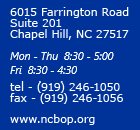Pharmacist FAQs
Frequently Asked Questions for Pharmacists on Clinical Pharmacist Practitioners
Follow this link for FAQs regarding the CPP Application and Protocol Review by the CPP Advisory Committee Member.
----------------------------------------------------------------------------------------------------------
Q: What are the CE requirements for Clinical Pharmacist Practitioners (CPPs)? A: CPPs must obtain 35 hours of “continuing education” per year. 21 NCAC 46.3101(d)(1). “Continuing education” is defined by the CPP rules as “courses or materials which have been approved for credit by the American Council on Pharmaceutical Education.” 21 NCAC 46.3101(a)(8). Effective July 1, 2016, CPP rule changes went into effect transferring primary administrative authority over CPP credentialing and renewal to the Board of Pharmacy. CPP credentials are no longer renewed on a schedule keyed to the CPP’s birthday. CPP credential renewals are now renewed annually on the same schedule as all other licenses, permits, and registrations issued by the Board of Pharmacy – “[e]ach CPP shall register annually on or before December 31.” 21 NCAC 46.3101(c)(1). All CPPs will be required to have obtained 35 hours of continuing education to renew in on or before December 31, 2017. There is no requirement that CPPs obtain some “pro-rated” additional amount of continuing education to account for the period of July 1, 2016 through December 31, 2016.
----------------------------------------------------------------------------------------------------------
Q: What is a Clinical Pharmacist Practitioner and how can I qualify for that designation? A: Through the efforts of the North Carolina Association of Pharmacists a change of statute occurred in both the Medical Practice Act and the Pharmacy Practice Act. This provides for designating certain pharmacists as Clinical Pharmacist Practitioners who collaborate with a supervising physician to provide optimum health care and use the extensive knowledge of pharmaceuticals by pharmacists. There are three ways in which a person can be qualified as a Clinical Pharmacist Practitioner. A person could hold a Board of Pharmaceutical Specialty Certification or complete an ASHP Residency and have two years of clinical experience. Another route is for individuals who have a Doctor of Pharmacy Degree with three years of clinical experience plus a certificate program. Pharmacists with B.S. degrees need five years of clinical experience and two certificate programs as defined in 21 NCAC 46.3101(2)(b). It is necessary to complete an application through the NC Board of Pharmacy. (Download a CPP application here Effective August 30, 2017 - All new applicants must first register through the Board's Gateway to create a user name and password. The Gateway allows access to all applications.) A collaborative practice agreement is necessary with a physician as noted in .3101(6). An initial non-refundable fee of $100 is payable to the NC Board of Pharmacy (by credit card only) with a $50 renewal fee. A total of 35 hours of continuing education is necessary to renew as a Clinical Pharmacist Practitioner (see FAQ above). Clinical Pharmacist Practitioners are in essentially the same position as a physician assistant or nurse practitioner. Medical acts which can be performed include prescribing and Clinical Pharmacist Practitioners who have controlled substances in their protocol can obtain a DEA registration.
|

